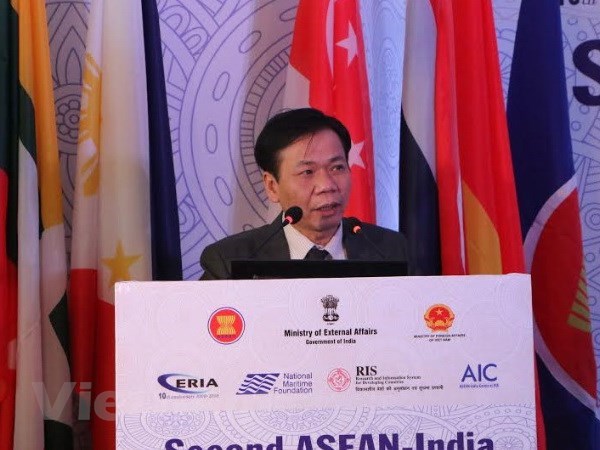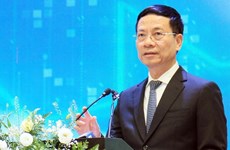Second ASEAN-India workshop on blue economy held
 Vietnamese Ambassador to India Ton Sinh Thanh at the event (Source: VNA)
Vietnamese Ambassador to India Ton Sinh Thanh at the event (Source: VNA)
New Delhi (VNA) – The second ASEAN-India Workshop on Blue Economy took place in New Delhi
on July 18, attracting over 60 delegates, including government officials,
scholars, and researchers from ASEAN and India.
As co-chairperson of the event, Vietnamese Ambassador to India Ton Sinh Thanh underscored the importance of blue economy in regional and global development, affirming that Vietnam and ASEAN member states consider maritime cooperation as one of the prioritised cooperation fields with India.
Building on the success of the first workshop of its kind held in Vietnam’s Nha Trang city in November 2017, he urged delegates to raise specific proposals to foster blue economy cooperation within the ASEAN-India strategic partnership framework, as well as strengthen regional maritime connectivity.
The diplomat expressed his hope that negotiations on the ASEAN-India maritime transport agreement would soon be concluded to ensure maritime security and safety, thus creating an environment conducive to sustainable development.
Secretary (East) of India’s Ministry of External Affairs Preeti Saran affirmed that India appreciates its long-standing maritime link with ASEAN member states, adding that India will earmark 190 billion USD to boost connectivity between its seaports and 27 new economic development areas in the next decade.
She invited ASEAN countries to consider joining the project, initially focusing on coastal special economic zones, investment consultation, maritime transportation, and tourism.
Vu Thanh Ca from the Hanoi University of Natural Resources and Environment said Vietnam has taken actions to step up its blue economy such as strengthening coastal management, mitigating illegal fishing, improving lives of fishermen via job creation, poverty reduction, and ensuring social equality.
Dr. Prakash Chauhan, Director of the Indian Institute of Remote Sensing, said India is effectively using remote sensing technology to support blue economy via weather and disaster forecasting, marine environment protection, and searching for waters suitable for fishing and tourism.
Dr. Prabir from the Research and Information System for Developing Countries (RISDC) proposed strengthening connectivity, especially facilitating maritime transportation via the ASEAN-India seaport network; investing in sea infrastructure; developing coastal special economic zones; and improving connectivity plans.
Participants shared the view that maritime security is crucial to developing blue economy, and proposed potential cooperation fields such as maritime connectivity, safety, and diplomacy.
They hoped for more discussions about blue economy towards realising specific projects between ASEAN and India.
The event was co-hosted by the Vietnamese Foreign Ministry, the Indian Ministry of External Relations, with the support of the Economic Research Institute for ASEAN and East Asia, the RISDC, and the National Maritime Foundation of India. -VNA










